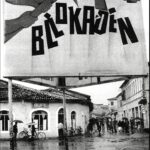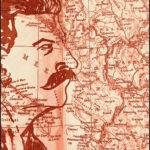Reworking Gastarbeiter sounds
Echoes of a musical journey between homeland and host country
Tomislav Matković or Tomo installed his DJ set turning the conference room in a disco plunged in the sounds of Ganga. Himself a son of Gastarbeiter, he calls his project Gangawerk. It echoes Arcadenwerk by Walter Benjamin (Benjamin, 1983): a rescue of a phantasmagoric world slowly disappearing, an amalgam of fragmented sounds, nostalgic tunes and folk songs. On the screen behind him “Radio Ganga” is playing, a 23-minute documentary by Tomislav Bubal and Zdenko Jurilj from 2019 for Tomo’s radio Grude shows. What better introduction to the magical journey of Gastarbeiter music and its afterlives. Even David Bowie could not resist to it: when he lived in Berlin he picked up on the sounds of the Turkish communities and incorporated them into songs such as Neuköln and Yassassin.
[#gastarbeitergroove is what you get while searching online for Gastarbeiter music. For the Turkish part of the story you can trust your ears to Nazlı Sağdıç Pilcz a.k.a. DJ Funshine, who prepared a playlist for the project #60JahreMusik financed by Berlin Yunus Emre Institute, available here]
There are so many passionate lovers of musical heritage who, as the creators of the milestone 2013 album ‘Songs of Gastarbeiter’, Imran Ayata and Bülent Kullukcu, made it their mission to “rummage through archives, search through the music collections of our parents and acquaintances, pester friends and strangers to find songs of guest workers” (https://www.songs-of-gastarbeiter.com/).
Myself just a historian of postwar European migration, I present you here my amateur glimpse to this recently rediscovered treasure. If you are equally excited as I am about migrating sounds, hop on my time machine and let’s land on West German soil sometime around the early 1960s. There, we meet the first generation of the Gastarbeiter: young women and men between 18 and 45 leaving behind their homelands in the South of Europe under an organized migration scheme that predicted their stay as temporary and defined their status as ‘guest workers’.
In 1970, the TV show Unter unserem Himmel (Under our sky) presented on the Bavarian television had a special episode, a tribute to the guest workers’ music. The episode was a kind of pub crowl following the sounds of saz, bouzouki and fado, a visit to the guest workers. The teaser advertised their music as exotic and other-worldly: “we employ hundreds of thousands of workers from Spain, Italy, Yugoslavia, Turkey and Greece. Most of them come from villages, from the most remote areas. As a piece of their home, they brought their musical instruments, their dances, their songs with them. In this program we hear their folk music: strange, but no less fascinating sounds”.
Here, while exploring these fascinating sounds, let’s keep in mind what Thomas Turino stresses in his Music as Social Life: The Politics of Participation : “music, dance, festivals, and other public expressive cultural practices are a primary way that people articulate the collective identities that are fundamental to forming and sustaining social groups, which are, in turn, basic to survival”. (Turino 2008, 2).
First stop: The train that takes them away
First, we can have a quick look at the hits of the 1960s sung by the Greek laiko music figure Stelios Kazantzidis. Already in the early 1960s thousands of workers were leaving “to the factories of Germany and the mines of Belgium” under the pressures of poverty and unemployment in Greece. The word ‘passport’ (διαβατήριο) and ‘poison’ (δηλητήριο) rhyme in greek and thus the comparison is ready:
“bitter as poison/ is the passport/ I took to go abroad./ But what can I do/ oh the poor/ in front of me I have a cliff/ and behind me a black stream”
As expected, many songs found their favorite leitmotiv in the train journey. Many photos of the time depict the moving farewell scenes at the train stations where people hung from the windows to say the last goodbye and relatives wave their handkerchiefs in a sign of arrivederci and adios . In 1972, a hit sung by Stelios Dionysiou went as follows
“in the Munich train station/ it threw me oh oh/ my black destiny, my poor mother. /Soon the dusk comes/ the Acropolis train arrives/ if only bringing/ a friend or acquaintance./ Every man and language/ who I know, who knows me/ these places are unfriendly/ and the hearts icy cold ” (my translation from Greek).
It was not only the people on the train who suffered the pain of separation, though. In a touching song of the 1974 album ‘Metanastes’ (Migrants) composed by Yannis Markopoulos, a mother suffers from being apart from her children:
“I’m speaking of my children and I’m sweating/ I haven’t seen them for a year and I’m melting/ Their grandma writes me they’re asking/ to where the trains from the station are departing.”
Obviously, romantic partners had it even harder and the travel by train to Germany became a popular motif also in Turkish music, highlighting the context of separation and fate (kismet). As the research team of the Ladies on Records suggest, “some songs romanticized the missing context, like “Almanya Treni” by Ferdi Tayfur. Others served as illustrations of the misery of the one who stayed. “Zalım gurbet treni seni elimden aldı” (The cruel expatriate train took you away from me) sang Gülcan Opel in “Gurbet Treni (1973)”
Second stop: the letters
The album “Letters from Germany” composed by Mikis Theodorakis in lyrics by Fontas Ladis was written in the spring of 1966. The reaction of the conservative government and the press was virulent, and eight out of the thirteen songs were censored. Finally, they were out again in 1975 in two versions by Minos and Lyra Records. In the Turkish case, the sorrowful, heartbreaking songs of Yüksel Özkasap matched with the feelings of many migrants. The titles of the songs like “Gurbet Mektubu” (The Letter from the Exile) or “Almanya’da Ölenler” (People Who Died in Germany) became very popular among Turkish migrants, helping them to channel their emotions related to migration, exploitation or loneliness. The simple form of these songs and the emotional atmosphere of lament were reminiscent of the funeral folk songs, in the Greek case termed moiroloi. George Matzouranisin his 1974 book Greek workers in Germany, quoted an adapted version of such a lament in tune with the current tragedy of depopulation:
“come out, my mother, and yell in all the neighborhoods/ all the
girls present to dress in black/ migration split us and took our kids/ their poor bodies are tortured in Germany/ to win their children’s bread ” (my translation from Greek).
Third stop: the workplace
Almanya is a “bitter homeland”, as Selda does in her cover of the Ruhi Su classic “Almanya Acı Vatan”. The working conditions in German factories were not left without commentary in songs like Metin Türkoz’s “Guten Abend, Mayistero”, a satirical portrait of the German foreman. Yüksel Özkasap’s “Zalim Almanya” (Germany, the tyrant) was not only a sad love song, but also a protest for the migrants’ low social status and limited opportunities. Sociocritical protest songs, or songs about international solidarity, were of particular interest to many highly politicized migrant workers from the 1960s and 1970s. (DOMID). The issue of inter-ethnic contacts and solidarity among the different nationalities is depicted in a song dedicated to the joint strikes that “Greeks, Turks and Italians do/for two Spaniards who died in the mines” . A common prayer by a priest and an imam was needed to bless their struggle. In the frantic pace of the Akkord production the worker had no time and no courage left to talk to his colleagues, as the song “I fabrika” (Τhe Factory) illustrated:
“the factory never stops/ it works night and day/ and what’s the name of my co-worker/ and of the crazy Italian/ neither can I ask/ nor breathe can I”.
Fourth stop: the night-out
Turkish guest workers gradually opened gazinos, live music venues where people could sit down at a table and enjoy a drink and mezze while listening to singers perform. The so-called ‘Turkish Bazaar’ in West Berlin was located at the disused, elevated Bülowstraße U-Bahn station and it was full of cafes and music shops, including one owned by legendary Turkish ashik (poet/bard), Nesat Ertas. As Nikola Bakovic (2015) suggests for the Yugoslav case, in the early 1970s, the state support shifted towards smaller-scale activities to facilitate migrants’ amateurism as a form of Yugoslav self-management. The Yugoslav state now concentrated on the ‘cultural’ events rather than on folk-inspired ‘entertainment’, in order to elevate the intellectual status of migrant workers and bring them closer to the ideals of an emancipated working class.
Fifth stop: foreigners out!
The Turkish duo Derdiyoklar took a swing at the social and political zeitgeist in 1981: “Helmut Kohl and also Strauß (le le dear Gabi) / Want all the foreigners out (le le dear Gabi)” they sing in German in the song »Liebe Gabi« (»Dear Gabi«). In 1983, the ‘Law for the Promotion of Foreigners’ Willingness to Return to Their Home Countries’ showed the conservatives’ wish to reduce migration, alongside the rising xenophobia in the Federal Republic. The migrants were in a limbo, between their homeland and their adoptive country, as this 1983 Greek song communicates: “in this place I love/
there is no hand to hold/ and I emigrated / but found no cure/ so I came, my homeland, to see you/ despite you hurting me”. The expectations were high and Gastarbeiter migration was vested with an aura of prestige, commodities and Mercedes cars as suggested by Thermiti, a band from Rijeka, in their 1996 song ‘Ujo gastarbajter’, ‘Uncle gastarbeiter’:
“my father was a miner/ My grandfather is naively alive/ My uncle is a guest worker/ Uncle, uncle, you have a nice car (4x). I died of winter/ In that cold night/ Waiting for you, uncle/ That you will come to me/ Uncle, uncle, you have a nice car/ Uncle, uncle, you drive a nice car (3x)”.
Back to the present
Many books, albums, projects grow nowadays through the curiosity about Gastarbeiter music and its potential for migrant community-building, empowerment but also dissemination and experimentation. Both lyrics and tunes are important in this process: “the haunting, critical, ironic and touching lyrics are central; they not only narrate but also critically reflect on the experience of migration and find resonances beyond the Turkish community. On the other hand, the aesthetic, musical and linguistic hybridity – multilingualism on a variety of levels- is significant for the affective reception […]” (Gratzer, Grosch, Präger, Scheiblhofer, 2023). Nedim Hazar recently offered his overview of the musical production of Turks in the Federal Republic since 1961 (Hazar, 2021), while Cem Kaya’s film Liebe, D-Mark und Tod (Love, Deutschmarks and Death, 2022) is a remarkable love song to the culture of his forefathers, and an attempt to pay due respect to the best ‘subculture’ pre-Wende Berlin had to offer.
As the title of the Tutzing Academy proposes the Wind of Change is in our hands: we can use it towards creative, progressive ways of solidarity and interdependence. We can find meaning in the heritage of minorities and underrepresented groups who never quit the fight for a decent life both in the host country and in their homelands. Rediscovering their music is one facet of repurposing their struggles and keeping alive their memories.
Bibliography
Ayata, Imran and Bülent Kullukcu. 2013. Songs of Gastarbeiter, TRIKONT.
Baković, Nikola 2015. “Song of Brotherhood, Dance of Unity: Cultural-Entertainment Activities for Yugoslav Economic Emigrants in the West in the 1960s and 1970s”, Journal of Contemporary History 50, no. 2, 354–75. [online platform] http://www.jstor.org/stable/43697379.
Benjamin, Walter 1983. ed. by Rolf Tiedemann. Das Passagen-Werk, Suhrkamp.
Cole, Dan 2017. Anarchy in the EU: East German Punk, europavox 12.7.2017<https://www.europavox.com/news/anarchy-e-u-east-german-punk/>,last access 10.3.2025
Cornils, Kristoffer 2020. A Journey into Turkish Music – Gastarbeiter*innen Musik, hhvmag 7.10.2020 [online platform] https://www.hhv-mag.com/feature/a-journey-into-turkish-music-gastarbeiterinnen-musik-2/?lang=en>, [last access] 10.3.2025
Gratzer, Wolfgang, Nils Grosch, Ulrike Präger, Susanne Scheiblhofer eds. 2024. The Routledge Handbook of Music and Migration: Theories and Methodologies. Routledge.
Hazar, Nedim 2021. Almanya Türküleri: Zur Kultur der türkeistämmigen Community seit dem Anwerbeabkommen 1961, Rotbuch.
Hotter, Georg 1970. Unter unserem Himmel – Besuch bei Gastarbeitern 27’19” [online platform] https://www.ardmediathek.de/video/unter-unserem-himmel/besuch-bei-gastarbeitern/br%20fernsehen/Y3JpZDovL2JyLmRlL3ZpZGVvLzQyZTIzNTdlLTdjOTctNGZhYy1hN2RmLThjMmMwNDRmMzBkMQ, [last access] 10.3.2025.
Kaya, Cem 2022. Aşk, Mark ve Ölüm – Liebe, D-Mark und Tod, documentary 96′.
Rigney, Robert 2023. Gastarbeiter music: The unsuspected sound of immigration, The Berliner 23.1.2023 [online platform] https://www.the-berliner.com/film/gastarbeiter-music-love-d-marks-death-turkish-canani-immigration/>, [last access] 10.3.2025
Turino, Thomas 2008. Music as social life: the politics of participation. University of Chicago Press.



















